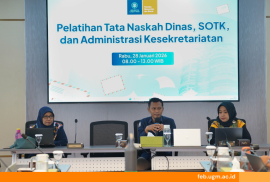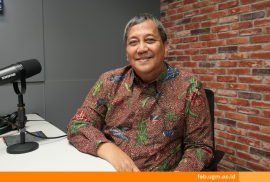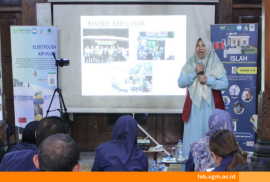The Undergraduate Academic Guidebook of the Faculty of Economics and Business Universitas Gadjah Mada (FEB UGM) serves as an official reference for students to navigate their academic journey. It provides comprehensive information on curriculum structure, academic regulations, grading systems, and student responsibilities. This guidebook is designed to help students plan their studies effectively and uphold academic standards throughout their time at FEB UGM.
Related Posts
FEB UGM Strengthens Professional Staff Competencies in Official Correspondence and Secretariat Administration
News Thursday, 29 January 2026
The Faculty of Economics and Business, Universitas Gadjah Mada (FEB UGM), held a training program on Official Correspondence, Organizational Structure and Governance (SOTK), and Secretariat Administration as part of efforts to enhance the competencies of FEB UGM professional staff in administrative and correspondence management.
FEB UGM Economist Says Global Uncertainty Triggers Gold Price Surge
News Thursday, 29 January 2026
Gold prices continue to strengthen in the global market, in line with rising investor demand for safe-haven assets amid growing global uncertainty.
Examining the Direction of Sustainable Transportation Development in Indonesia
News Wednesday, 28 January 2026
The transportation sector is one of the key drivers of the modern economy, supporting human mobility, logistics, and interregional connectivity elements essential to economic growth.
FEB UGM Training on Rainwater Management and Utilization
News Tuesday, 27 January 2026
The Faculty of Economics and Business, Universitas Gadjah Mada (FEB UGM), continues to demonstrate its commitment to supporting environmental sustainability. One such effort involves water conservation initiatives.




